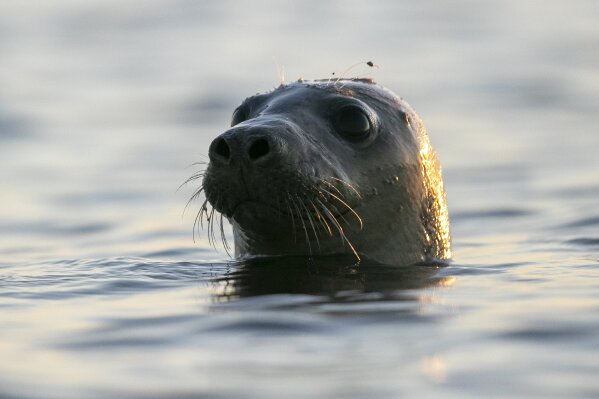More seals means learning to live with sharks in New England
PORTLAND, Maine (AP) 1 ; Seals are thriving off the Northeast coast thanks to decades of protections, and that victory for wildlife has bro ght a conseq ence for h mans 1 ; more enco nters with sharks.
Seals are a favorite prey of large sharks s ch as the great white. The death this week of swimmer J lie Dimperio Holowach, who was killed by a great white off Harpswell, Maine, might have happened beca se the shark mistook her for a seal, a thorities said.
Swimmers off the New England states have learned to be more mindf l in recent years d e to a spate of sightings of great whites, the apex predator made famo s in the movie ;Jaws. 1; A shark that killed a man off Cape Cod in 18 was also believed to be a great white.
That was the first fatal shark attack in Massach setts in more than eight decades, while the death of Holowach on Monday was the first doc mented fatal shark attack in Maine history.
;They’re not vindictive or mad or angry or preferring h man flesh. They j st occasionally make a mistake. And it’s tragic when they do, 1; said Greg Skomal, a shark specialist with the Massach setts Division of Marine isheries. ;As we restore top predators, the potential for these interactions co ld increase. 1;
Incidents of shark bites remain vanishingly rare, especially in Northeastern waters. The International Shark Attack ile at the University of lorida lists only 1 nprovoked shark attacks off New England, according to records that go back to 1837.
The majority of doc mented shark attacks in the U.S. happen off lorida, and internationally, warm weather co ntries s ch as So th Africa and A stralia have higher totals than most. B t shark bites are rare in those places, too. A stralia has been the site of 65 nprovoked shark attacks according to records that go back to 158 , the International Shark Attack ile reported.
Shark bites in colder northern waters are not nheard of. A handf l have been recorded off R ssia, inland and Washington state. And researchers are seeing more of the great whites off New England, said James S likowski, a researcher of Northeastern sharks who is located at Arizona State University.
The greater n mber of sightings is ; neq ivocally 1; beca se of the res rgence of seals in New England, S likowski said. The seal comeback traces to the Marine Mammal Protection Act of 197 , which afforded seals a chance to repop late after generations of h man exploitation.
Grey seals, once h nted with bo nties and p shed close to the point of local extinction, are now common sights in coastal Cape Cod. Some people even feel the animals have come back to the point where they pose a n isance, in part beca se they draw more sharks.
The sharks aren’t looking for people, b t they’re a reason for swimmers to be ca tio s, S likowski said.
;They’re not looking for s. We’re not on the men , 1; he said. ;B t as these predator prey relationships contin e, and beca se they are so coastal, there 17;s potential for interaction with h mans to increase. 1;
In Maine, marine patrol officers are cond cting searches for the presence of sharks in the aftermath of Holowach’s death. The state is restricting swimming at some state parks. And it has sent a clear message to beachgoers 1 ; if yo see seals, stay away.




